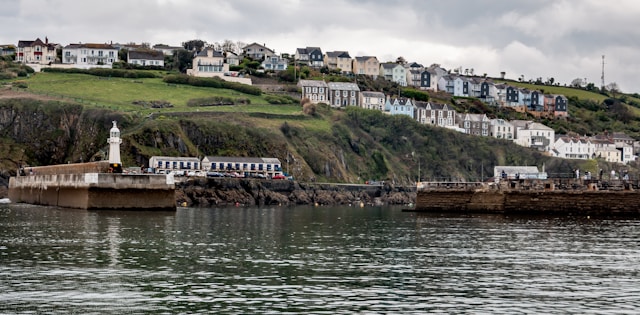FARMERS in the Mevagissey catchment will help Westcountry Rivers Trust (WRT) bolster flood resilience in the area.
The Climate Resilient Mevagissey (CRM) project, funded by Defra’s Natural Flood Management programme, will be led by the trust in partnership with the community, farmers, the Environment Agency (EA), Climate Vision, Cornwall Council, and the University of Plymouth.
Historic flooding
Dr Laurence Couldrick, CEO at WRT, said: “Mevagissey is a steep-sided rapid-response catchment which has flooded 27 times since 1960, most significantly in 2010 when more than 70 homes and businesses were flooded.
“Flooding can occur within an hour of peak rainfall, which is why our project is designed to slow, move and store water through soil management and nature-based solutions.
“This builds on important past work and relationships in the area, as well as integrating with existing projects such as Resilient Catchment Communities funded through the Shared Prosperity Fund.”
This will be at a scale and density for change to be monitored through the EA’s flow gauge station on the Mevagissey Stream.
Catchment-based approach
Simon Jeffery, Senior Advisor with the EA’s (West) Flood and Coastal Risk Management, Partnership and Strategic Overview Team, said: “With climate change forecast to bring warmer, wetter winters, along with an increased risk of localised intense summer rainfall, this project aims to demonstrate how a whole catchment-based approach can support community resilience.
“We look forward to working with our partners, communities, and landowners to monitor changes to catchment health and river flows upstream – particularly the scale, duration and frequency of high river flows, and will gather local data, monitoring improvements at a catchment scale and tracking soil health and habitat improvements.
“The aim is that in addition to improvements for Mevagissey, the EA will be able to use the evidence to demonstrate how a catchment-based approach can be applied in the South West and provide evidence as part of research across the wider Natural Flood Management Programme.”
Farming community
Farmers are already committed to supporting the scheme to help ensure land management practices reduce run-off.
Luci Isaacson, Director of Climate Vision, said: “We are thrilled to continue elements of our previous Tackling Climate Change project in the area through CRM.
“Recognising the significance of local knowledge, our focus on natural flood management in Mevagissey extends beyond mitigation measures – we aim to foster discussions about aligning what we purchase with a more sustainable, long-term perspective to enhance resilience.
“We have sought input on the flood management possibilities with farmers, prioritising their needs and preferences such as shared machinery that improves soil health to ensure delivery of practical and community-driven solutions.”
People living in the catchment will be encouraged to volunteer as part of the project, including through citizen science.
Cllr James Mustoe for Mevagissey and St Austell Bay said he is delighted to see this new innovative bid progress, and the enthusiastic endorsement from the local farming community.
“The proposals make a clear and persuasive argument for green and sustainable steps that can be taken to reduce flooding in our parish.
“I hope to see the project make a positive difference for the community of Mevagissey in the future.”
Natural Flood Management Programme
The project is one of 20 across seven River Trusts awarded funding from Defra’s £25m Natural Flood Management programme for nature interventions to protect communities at risk of flooding, as well as improving biodiversity and habitat.
Mark Lloyd, Chief Executive of The Rivers Trust, responded to the 23 February announcement, said: “I’m extremely proud that the Rivers Trust movement has been so successful in this round of funding.
“The local Trusts who have been successful will be able to deliver some great benefits, working with nature to slow the flow of water through their catchments and protect local communities.”
Natural Flood Management (NFM) interventions such as wetland creation, leaky dams and improved soil conditions support the natural processes of river catchments to absorb and/or disperse of excess water effectively.
Photo credit: Ray Harrington via Unsplash


Excellent!
However, it would be good to have more information on the last paragraph….. or perhaps the details of the scheme have not yet been designed.
This sounds encouraging. Which areas in Cornwall are being covered by this new funding.
Hello – this article relates to the funding for the project in the Mevagissey catchment. Other areas awarded funding from Defra’s NFM programme can be seen here: https://www.gov.uk/guidance/natural-flood-management-programme
Hello – yes, the details of the NFM to be delivered will be decided in the coming months. We’ll update on our website, social media and via our newsletter
I am delighted for Mevagissey. So, how about doing the same in the St Blazey/Par area which is also at risk of severe flooding? Instead, South West Water wants to build a desalination plant which will extend into the largest known seagrass bed in England and put maerl and marine life at risk. Research shows seagrass helps protect against coastal erosion and flooding. This is a rural area with loads of farmland higher up in the Tywardreath and Par Parish area in particular. This type of scheme would be a win-win for us. No risk to the marine environment and water captured would help mitigate flooding. Please do this in our community. Say no to desalination!
Hello. We have been working on the Cornwall Council-led StARR project in St Blazey and Par for several years. You can see the film following the project’s completion this month here: https://wrt.org.uk/project/starr/